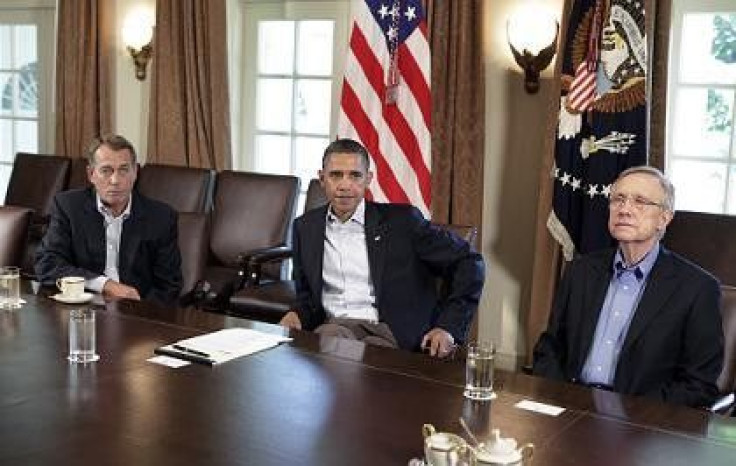Obama, Boehner Back at Debt Deal Table

Analysis
House Speaker John Boehner, R-Ohio, recalibrating after announcing Friday that the debt deal talks had reached an impasse, reconsidered, and Saturday took pains, along with President Barack Obama, to underscore that the talks have been re-started.
We are working, and I'm confident there will be resolution, Mr. Boehner told fellow House Republicans on an afternoon conference call, according to participants Saturday, The New York Times reported. There has to be.
Indeed, there has to be. U.S. and global markets appear just about set to starting pricing-in what up until now in the modern era had been unthinkable -- a default by the U.S. Government -- the largest and most technologically-advanced economy in the world.
That default -- or even the hint of that fault -- would force institutional investors to 'price-in' the increased risk -- i.e. increase the interest rate it asks to hold U.S. debt.
Further, because the U.S. Government is considered the lowest risk in the world -- those higher interest rates -- or increased risk -- would ripple through the financial system -- pushing up interest rates on everything from home mortgages, to car loans, to credit cards and student loans, among other destructive consequences.
Congress needs to raise the debt ceiling by Aug. 2, when the federal government both runs out of money and loses the authority to borrow more money.
U.S. Federal Reserve Chairman Ben Bernanke said last week a default by the U.S. Government would be a financial calamity that would send a shockwave through the global financial system.
And it's entirely avoidable, if Republicans and Democrats can find common ground, and Saturday Boehner, perhaps sensing that time, as Obama has underscored, is getting short, told GOP colleagues he and Obama and other Congressional Leaders are now working on a plan to cut $3 trillion to $4 trillion in spending over 10 years.
Boehner Spokesman Michael Steel said the Speaker Boehner is working in good faith with the goal of having something to present to their members on Monday. The Washington Post reported Saturday.
Boehner and other Capitol Hill officials, Minority Leader Mitch McConnell, R-Ky., Majority Leader Harry Reid, D-Nev., and Minority Leader Nancy Pelosi, D-Calif., and Vice President Joe Biden, D-Dele., met with Obama at the White House for about an hour, after which officials were told to report back to the White House for a late afternoon session, The Post reported.
As I said last night, over this weekend Congress will forge a responsible path forward, Boehner said in a statement. House and Senate leaders will be working to find a bipartisan solution to significantly reduce Washington spending and preserve the full faith and credit of the United States.
Political/Public Policy Analysis: Oh, what the United States would do for the return of President Lyndon B. Johnson. LBJ would look both sides squarely in the eye, and then say, 'I'm going to lock you both in a room. Now don't come out until you have an agreement.'
Financial markets are beginning to get concerned that the debt ceiling will not be raised. Hence it behooves Democrats and Republicans to forge a debt deal that also substantially cuts the deficit by Sunday night, or as soon as possible thereafter. The bond market could begin to get bumpy Monday -- something no market official or investor wants to see -- hence time is obviously of the essence.
Due to Boehner's return to the negotiating table, we're keeping the risk barometer, on a scale of 0 to 100 percent, of the likelihood of a U.S. Government default, at 20 percent on Saturday night, the same as it was on Friday afternoon.
© Copyright IBTimes 2024. All rights reserved.











